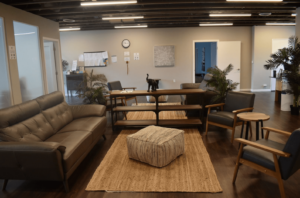Veterans who have served our country with honor and dedication often face a complex web of challenges when transitioning back to civilian life. Among these challenges, substance use disorders represent one of the most significant and misunderstood issues affecting our veteran community. Understanding why veterans are particularly vulnerable to addiction and substance abuse is crucial for providing effective, compassionate care that addresses their unique needs and experiences.
At Tres Vistas Recovery, we recognize the distinct challenges veterans face and offer specialized veteran’s rehab programs designed to address the complex intersection of military service, trauma, and addiction. According to the Department of Veterans Affairs, substance use disorders affect veterans at higher rates than the general population, making specialized treatment approaches essential for effective recovery.
The Hidden Struggles of Military Service
Military service involves experiences that can profoundly impact an individual’s mental health and relationship with substances. Combat exposure, extended deployments, witness to traumatic events, and the constant stress of military life create a unique psychological landscape that civilians may struggle to understand. The National Institute on Drug Abuse (NIDA) reports that more than one in 10 veterans who seek care at the U.S. Veterans Administration meet the criteria to be diagnosed with a substance use disorder—slightly higher than the rate among the general population.
The military culture itself can sometimes inadvertently contribute to substance use patterns. The emphasis on toughness, self-reliance, and pushing through pain—while valuable in military contexts—can make it difficult for veterans to seek help when struggling with emotional or psychological challenges. This cultural barrier often leads to self-medication with alcohol or drugs as a way to cope with underlying issues.
Combat Trauma and PTSD: A Complex Relationship
Post-Traumatic Stress Disorder (PTSD) is one of the most significant risk factors for substance use disorders among veterans. The intense and often life-threatening situations experienced during military service can leave lasting psychological scars that don’t simply disappear upon returning home. Veterans may turn to alcohol or drugs to numb the intrusive memories, nightmares, and hypervigilance that characterize PTSD.
Research from the National Center for PTSD shows that in the U.S., about 4 out of 10 adults who have PTSD also have problems with drug or alcohol use, with research suggesting that for most people who have both PTSD and problems with alcohol or drug use, PTSD develops first. This co-occurrence of PTSD and substance use disorders creates a complex clinical picture that requires specialized treatment approaches addressing both conditions simultaneously.
The relationship between trauma and substance use often becomes a destructive cycle. Veterans may initially use substances to cope with trauma symptoms, but over time, the substance use itself can worsen PTSD symptoms, leading to increased consumption and eventual dependency. Breaking this cycle requires comprehensive treatment that addresses both the underlying trauma and the substance use disorder.
Physical Pain and Prescription Drug Dependency
Many veterans return from service with physical injuries, chronic pain conditions, or disabilities that require ongoing medical management. The legitimate use of prescription pain medications can sometimes evolve into dependency or addiction, particularly when veterans are dealing with both physical pain and emotional trauma. The Centers for Disease Control and Prevention (CDC) has highlighted the prescription opioid crisis as a significant public health concern, with veterans being particularly vulnerable due to higher rates of chronic pain conditions.
Our opioid treatment programs at Tres Vistas Recovery are specifically designed to help veterans and others overcome prescription drug dependency through evidence-based approaches including medication-assisted treatment and comprehensive therapy services.
Transition Challenges and Social Isolation
The transition from military to civilian life presents unique stressors that can contribute to substance use disorders. Veterans must adapt to different social structures, employment challenges, and loss of the close-knit community that military service provides. This transition period, often referred to as “reintegration,” can be particularly difficult for veterans who have served multiple deployments or spent many years in the military.
Key transition challenges include:
- Loss of Purpose and Identity: Military service provides clear structure, purpose, and identity. Civilians may struggle to understand the profound sense of loss veterans experience when this framework is removed.
- Employment Difficulties: Translating military skills to civilian careers can be challenging, leading to underemployment, financial stress, and feelings of inadequacy.
- Social Disconnection: The bonds formed during military service are unique and intense. Veterans may feel isolated in civilian settings where others haven’t shared similar experiences.
These transition stressors can make substances seem like an attractive coping mechanism, providing temporary relief from feelings of disconnection, purposelessness, or anxiety about the future.
Co-Occurring Mental Health Disorders
Veterans experience higher rates of various mental health conditions beyond PTSD, including depression, anxiety, traumatic brain injury (TBI), and sleep disorders. According to the National Institute of Mental Health (NIMH), approximately 7.6% of U.S. adults experienced both a mental health disorder and substance use disorder in 2021, with veterans showing even higher rates of co-occurring disorders.
The complexity of treating multiple mental health conditions alongside substance use disorders requires specialized expertise and integrated treatment approaches. At Tres Vistas Recovery, our dual diagnosis programs are designed to address these co-occurring conditions simultaneously, recognizing that effective treatment must consider the whole person rather than treating symptoms in isolation.
The Role of Military Sexual Trauma
Military Sexual Trauma (MST) represents another significant risk factor for substance use disorders among veterans. Both male and female veterans who have experienced MST are at increased risk for developing PTSD, depression, and substance use disorders. The shame and stigma associated with MST can make it particularly difficult for veterans to seek help, leading to prolonged suffering and increased risk of self-medication through substances.
Barriers to Seeking Treatment
Veterans face unique barriers when seeking treatment for substance use disorders. These barriers can include:
Stigma and Cultural Factors:
- Fear of appearing weak or unable to handle problems independently
- Concern about career implications or security clearance issues
- Mistrust of healthcare systems or authority figures
Practical Barriers:
- Geographic isolation from treatment centers
- Insurance or financial concerns
- Long waiting times for VA services
- Transportation difficulties
Treatment-Specific Concerns:
- Preference for treatment providers who understand military culture
- Need for trauma-informed care approaches
- Desire for peer support from other veterans
Specialized Treatment Approaches for Veterans
Effective treatment for veterans with substance use disorders must acknowledge and address the unique aspects of military experience. At Tres Vistas Recovery, our veteran-focused treatment approaches include:
Trauma-Informed Care: Understanding how military trauma affects brain function, behavior, and relationships allows us to provide more effective treatment that doesn’t inadvertently re-traumatize veterans during the recovery process.
Peer Support: Connection with other veterans who understand military culture and experiences can be incredibly healing. Group therapy sessions that include other veterans provide a sense of camaraderie and mutual understanding that’s difficult to replicate in mixed groups.
Evidence-Based Therapies: Our intensive outpatient programs incorporate therapies specifically shown to be effective for veterans, including Cognitive Behavioral Therapy (CBT), Dialectical Behavior Therapy (DBT), and trauma-focused interventions.
Holistic Approaches: Recognizing that healing involves mind, body, and spirit, we incorporate holistic therapies such as mindfulness practices, yoga, and meditation that can help veterans develop healthy coping mechanisms and reconnect with their sense of purpose.
The Importance of Family Involvement
Military service affects not just veterans but their entire families. Spouses, children, and other family members may also experience secondary trauma, stress, and confusion about how to support their veteran loved one. Our family therapy programs recognize that recovery is often a family journey, providing education, support, and healing opportunities for all family members affected by military service and substance use disorders.
Hope and Recovery: Veterans Can Heal
Despite the unique challenges veterans face, recovery is absolutely possible with the right support and treatment approach. Veterans possess many strengths that can support their recovery journey, including discipline, resilience, the ability to work as part of a team, and experience overcoming difficult challenges. When these strengths are channeled toward recovery and supported by appropriate treatment, veterans can achieve lasting sobriety and rebuild fulfilling lives.
Moving Forward: Creating Support Systems
Creating effective support systems for veterans requires understanding, patience, and specialized knowledge. Whether you’re a veteran struggling with substance use, a family member seeking to help, or a community member wanting to support veterans, understanding these unique challenges is the first step toward effective support.
At Tres Vistas Recovery, we’re committed to providing veterans with the specialized care they deserve. Our comprehensive approach addresses not just the substance use disorder but the underlying factors that contribute to addiction, including trauma, co-occurring mental health conditions, and the unique stressors of military-to-civilian transition.
If you or a veteran you know is struggling with substance use, remember that seeking help is a sign of strength, not weakness. Recovery is possible, and with the right support, treatment, and understanding, veterans can overcome addiction and thrive in their civilian lives.
Take the first step toward recovery today. Contact Tres Vistas Recovery at (844) 578-1971 to learn more about our specialized veteran treatment programs and how we can support your journey to lasting sobriety. Remember, you’ve served your country with honor—now let us serve you on your path to healing and recovery.














